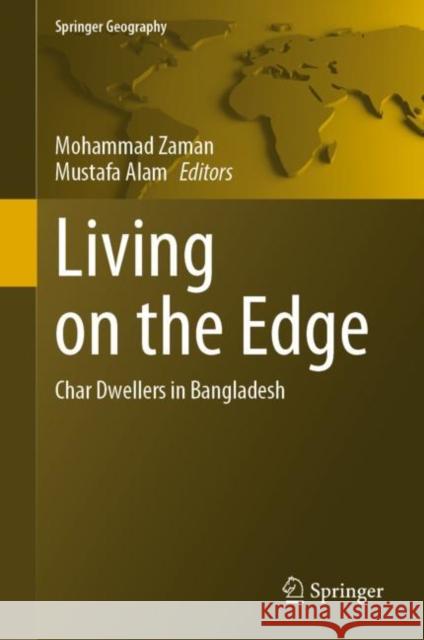Living on the Edge: Char Dwellers in Bangladesh » książka



Living on the Edge: Char Dwellers in Bangladesh
ISBN-13: 9783030735913 / Angielski / Twarda / 2021 / 450 str.
Living on the Edge: Char Dwellers in Bangladesh
ISBN-13: 9783030735913 / Angielski / Twarda / 2021 / 450 str.
(netto: 546,94 VAT: 5%)
Najniższa cena z 30 dni: 575,62 zł
ok. 20 dni roboczych.
Darmowa dostawa!
"This book will serve well those who seek to know what it is like for these dwellers to live in chars in the middle of our mighty rivers on their estuaries, and what it will take to improve their conditions." (ATM Nurul Amin, The Daily Star, thedailystar.net, May 16, 2022)
I INTRODUCTION
Background, Context and Organization of the Book
Mohammad Zaman and Mustafa Alam
II THEORIZING DELTA AND CHARLAND
1. The Delta and Charland in Historical and Comparative Perspectives
Mohammad Zaman, Mustafa Alam and Benoit Ivars
2. Chars as Destabilizers
Kuntala Lahiri-Dutt
- Char Dwellers’ Right to Development
Indrani Sigamany and Jay Drydyk
III GEOMORPHOLOGY OF BENGAL DELTA
- Morphologic Instability and Erosion Problems in the River Systems of Bangladesh
Harun Rashid and Munshi K. Rahman
- Use of Remote Sensing Data to Study the Behavior and Dynamics of Riverine Chars in Bangladesh
Iffat Huque, Maminul Haque Sarker and Knut Oberhagemann
- Geomorphological Evolution of Riverine Chars
Knut Oberhagemann, Maminul Haque Sarker and Iffat Huque
- The Dynamics of Coastal Chars in Bangladesh
Maminul Haque Sarker, Iffat Huque and Knut Oberhagemann
Hugh Brammer
9. Evaluating Future Risk: Quantifying the Effects of Climate Change on Riverine and Coastal CharsShampa and Anisul Haque
IV CHAR SETTLEMENT IN HISTORICAL AND CONTEMPORARY CONTEXTS
Mohammad Zaman
- Dynamic Land and Adaptive People of Bengal Delta: A Spatio-Temporal Perspective
C. Emdad Haque and Mohammad Jakariya
- Coping Strategies and Future Resettlement Options of People Displaced by Riverbank Erosion in the Lower Meghna Estuary
Bimal Kanti Paul, Munshi Khaledur Rahman, Thomas Crawford, Scott Curtis, Md. Giasuddin Miah, Rafiqul Islam and Md. Sariful Islam
- Floods, Charlands Erosion and Settlement Displacement in the Ganges-Padma River Basin
Shafi Noor Islam
- Flood Proofing Measures for Char Communities in Bangladesh
Ian Tod
- Char Development for Addressing Riverbank Erosion related Displacement
Atiur Rahman
V CHAR ECONOMY, LIVELIHOOD, GENDER AND OUTMIGRATION
- Understanding Char Economy: Household Perspective and the National Context
Mustafa Alam
- Vulnerability to Natural Hazards and Community-based Adaptation in Agriculture: A Case Study
Zobaer Ahmed, Herman Lotze-Campen and Md. Humayun Kabir
- Coping of Char Agricultural Marketing System to Hydro-meteorological Hazards
M. Aminur Rahman, M. Shahjahan Mondal and M. Rezaur Rahman
- Role of NGOs in Post-Flood Rehabilitation in Chars in Gaibandha District, Bangladesh
Babul Hossain
- Gender Issues and Social Development Challenges in Char Environments
Suzanne Hanchett
- Out Migration as a Survival Strategy for Char Dwellers: Findings from Three Selected Chars
Hafiza Khatun, Md. Humayun Kabir and Lutfun Nahar
VI CASE STUDIES ON MAJOR EXPERIMENTS IN CHAR DEVELOPMENT
- The Chars Livelihoods Program: Experiences and Learnings
Lokman Hossain
- Livelihood Development in Coastal Chars in the Meghna Estuary: The Danida Experience
Harvey Demaine
Koen de Wilde,
Nazmul Islam Chowdhury
VII LAND RIGHTS, INSTITUIONS AND GOVERNANCE
- Alluvial and Diluvial Land Laws and Administration: A Paradigmatic Shift Necessary to Benefit Displaced People
Mohammad Zaman and Md. Akhtar Hossain
- Char Development Authority and Governance Issues
Mohammad Zaman and Mustafa Alam
VIII CONCLUSIONS
Toward an Inclusive and Integrated Char Development Program
Mohammad Zaman and Mustafa Alam
1997-2024 DolnySlask.com Agencja Internetowa
KrainaKsiazek.PL - Księgarnia Internetowa









